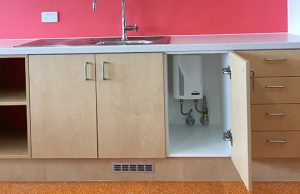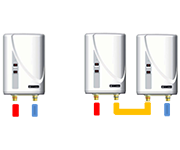
Tankless Water Heaters
Tankless water heaters – also known as on-demand water heaters – provide hot water only when needed, eliminating the energy losses associated with heating and storing water in a tank. This makes them highly efficient, as they typically consume less electricity compared to conventional systems. This is achieved by heating water only as it passes through the unit, offering a constant supply without unnecessary reheating.
Although the initial installation cost for tankless water heaters may be higher, the long-term energy savings often offset this expense. Studies have shown that tankless systems can be 24–34% more energy-efficient than traditional tank-based models, making them a sound investment for energy-conscious homeowners.
Heat Pump Water Heaters
Unlike conventional electric water heaters, which directly generate heat, heat pump water heaters use electricity to transfer heat from the surrounding air or ground to heat the water. This process is far more efficient, as it moves heat rather than generating it.
As they use renewable energy from the environment, heat pump water heaters can be up to three times more efficient than regular electric heaters. Although these systems work best in moderate climates, modern advancements have made them versatile enough to handle different environmental conditions. For those wanting to reduce energy consumption and associated greenhouse gas emissions, heat pumps are one of the most efficient appliances on the market.
Energy Saving Tips for Hot Water Systems
Whether you opt for tankless water heaters, heat pump water heaters or other efficient appliances, there are a number of strategies you can adopt to further reduce your energy usage and costs:
Lower Your Thermostat Settings
Many Australian households keep their water heater thermostats unnecessarily high. Lowering the temperature just a few degrees can make a noticeable difference in energy consumption without affecting your comfort.
Use Low-Flow Fixtures
Installing low-flow showerheads and taps can instantly help reduce the amount of hot water you use, leading to significant savings over time. Less water use means less energy spent on heating.
Schedule Regular Maintenance
Keeping your hot water system in good working condition is essential for maintaining energy efficiency. Regular maintenance can address issues like sediment build-up, which can impair the system’s performance and increase energy use.
Making the Right Choice for Your Home
Choosing the most suitable hot water system for your home will ultimately depend on your household needs and budget. While tankless water heaters and heat pump water heaters are excellent energy-saving choices, be sure to compare your options and seek advice where needed. The right choice will not only save energy, but significantly lower your household’s utility bills in the long run.
To find out how you can reduce energy usage and costs with an efficient tankless water heater, contact MicroHeat today.



